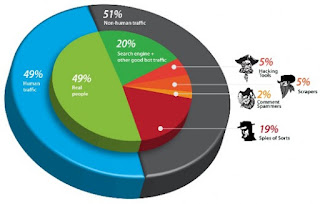I'll be honest. I love infographics every bit as much as the next hungry information consumer. I adore the snapshot presentation of facts that gives me a glimpse of the impact and reach of certain phenomenon. (In fact, I'm producing a science show for kids that uses this approach very heavily.)
BUT -- I also know that one must be careful to check the underlying facts and the methodology with which the picture in an infographics is assembled. There is an old saying that "figures don't lie, but liars can figure." If you also consider the timeworn saw that "a picture is worth a thousand words" you can deduce that liars who can figure AND who can create infographics have 1000 more ways to lie!
Here's one from an article I saw recently.
After taking a look at the underlying data, I reached this conclusion.
Some promising developments hidden in the data here.
First of all, the original article cites the source with some respect, but we might also note that the study is conducted (or funded) by a company whose interest is served by convincing you that it's scary out there and you need what they sell.
Second, one element of the "scary" part is the class they call scrapers and deem "potentially malicious." Some portion of that category is also properly deemed beneficial as in the case where a syndicator or curator is gathering material to present it for additional exposure. (My presumption is that much of what's presented on the Internet is there so that it can be discovered, read, and shared.) Certainly there are malicious uses for scrapers, but the entire category cannot be considered en masse as a threat.
Third, the largest part of the presumably dangerous segment is called "spies of sorts" and again there is a portion of that which is potentially beneficial as in the case where an automated agent can detect the behavior patterns of systems which represent a genuine threat.
Finally then, if we aggregate the portion that this study admits is beneficial (the search engines and indexers) along with the beneficial portions of these other two categories, we can see that a noteworthy portion of all the traffic on the internet is a function of (a still crude, but in total) new sort of intelligence which has emerged in our time.
Unless you subscribe to the school of thought which maintains that humans are unique and in some way entitled to exclusive and preferential treatment by the universe -- it may be thrilling to discover that a new intelligent "race" is emerging and that we are the creators.
That's what I see in these statistics. Not for nothing, but I'm finding myself a little bit suspicious lately when I encounter claims of dire threat. I've been sold that mythical wolf a number of times lately.
BUT -- I also know that one must be careful to check the underlying facts and the methodology with which the picture in an infographics is assembled. There is an old saying that "figures don't lie, but liars can figure." If you also consider the timeworn saw that "a picture is worth a thousand words" you can deduce that liars who can figure AND who can create infographics have 1000 more ways to lie!
Here's one from an article I saw recently.
After taking a look at the underlying data, I reached this conclusion.
Some promising developments hidden in the data here.
First of all, the original article cites the source with some respect, but we might also note that the study is conducted (or funded) by a company whose interest is served by convincing you that it's scary out there and you need what they sell.
Second, one element of the "scary" part is the class they call scrapers and deem "potentially malicious." Some portion of that category is also properly deemed beneficial as in the case where a syndicator or curator is gathering material to present it for additional exposure. (My presumption is that much of what's presented on the Internet is there so that it can be discovered, read, and shared.) Certainly there are malicious uses for scrapers, but the entire category cannot be considered en masse as a threat.
Third, the largest part of the presumably dangerous segment is called "spies of sorts" and again there is a portion of that which is potentially beneficial as in the case where an automated agent can detect the behavior patterns of systems which represent a genuine threat.
Finally then, if we aggregate the portion that this study admits is beneficial (the search engines and indexers) along with the beneficial portions of these other two categories, we can see that a noteworthy portion of all the traffic on the internet is a function of (a still crude, but in total) new sort of intelligence which has emerged in our time.
Unless you subscribe to the school of thought which maintains that humans are unique and in some way entitled to exclusive and preferential treatment by the universe -- it may be thrilling to discover that a new intelligent "race" is emerging and that we are the creators.
That's what I see in these statistics. Not for nothing, but I'm finding myself a little bit suspicious lately when I encounter claims of dire threat. I've been sold that mythical wolf a number of times lately.
On the other hand, I might still consider the benefits of Incapsula's software and solutions.




No comments:
Post a Comment